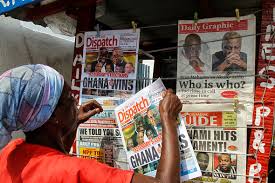The concerns raised by the Bank of Ghana (BoG) on the nation’s economic recovery from the havoc wreaked by the COVID-19 pandemic and the 696 new cases of the Coronavirus disease recorded by Ghana, pushing the country’s active cases to 6,086 are some of the trending stories in the Ghanaian press on Friday.
The Graphic reports that the Bank of Ghana (BoG) has expressed fears that economic recovery from the havoc wreaked by the COVID-19 pandemic will take longer than initially anticipated.
It said although economic activities had picked up quite well following contraction in the second and the third quarters of last year, the resurgence in the pandemic earlier this year had heightened the uncertainty around recovery and growth.
In a press statement issued last Monday after the first meeting of the Monetary Policy Committee (MPC) in the year, the Governor of the BoG, Dr. Ernest Addison, said the renewed threat posed by the second wave of the pandemic risked slowing down the pace of economic recovery in the short term.
“In the domestic economy, growth has picked up since the sharp contraction in the second quarter of last year. All the high-frequency indicators of economic activity have rebounded; consumer and business confidence levels are back at pre-lockdown levels and there are indications of a steady growth in private sector credit.
“However, the renewed threat from the second wave of the pandemic has again heightened uncertainty and could hamper the recovery process in the near-term,” the press statement, which also announced the decision of the MPC on the bank’s policy rate, said.
The central bank’s fears come at a time when the COVID-19 daily infection rate, the number of infected persons requiring intensive care and the number of people succumbing to the virus have all assumed grim milestones.
The situation has forced the government to re-impose restrictions on some daily routines and social activities in an attempt to contain the spread of the virus and mitigate the impact on the economy.
The BoG maintained the policy rate at 14.5 percent for the fifth time in a row, citing the need to help ease the pressure on inflation and support economic recovery efforts.
The newspaper says that Ghana has recorded 696 new cases of the Coronavirus disease, pushing the country’s active cases to 6,086.
Seven more deaths have also been recorded, bringing the total deaths to 440.
According to the Ghana Health Service (GHS), 389 persons who tested positive for the virus have also been discharged or clinically recovered.
This brings the total discharged or clinically recovered to 62,729.
Ghana as at February 1, 2021 has recorded 69,255 confirmed cases since March 2020.
The Graphic also reports that the Speaker of Parliament, Mr. Alban S. K. Bagbin, has revealed that 15 Members of Parliament (MPs) have tested positive for the coronavirus disease (COVID-19).
They are from the total 227 MPs who recently undertook the COVID-19 test.
In addition to that, 56 staff of Parliament out of the total 193 have also tested positive for COVID-19.
As part of measures to help curb the spread of the disease, Parliament has decided to sit twice from next week.
According to the report, the House will sit on Tuesdays and Thursdays until further notice.
The Times says that Standard Bank, parent company of Stanbic Bank Ghana, is forecasting a growth rate of 3.5 percent for Ghana this year.
This is a little below that of the International Monetary Fund, Moody’s and Fitch Solutions, which have all projected more than 4.0 percent Gross Domestic Product in 2021.
The report also said the size of the Ghanaian economy would remain unchanged at $63 billion, approximately GH¢421 billion.
According to Standard Bank, COVID-19 pandemic would undoubtedly affect economic growth meaningfully.
“Whereas growth of six percent to eight percent year-on-year in the next two to three years seemed reasonable before, 1.0 percent year-on-year growth now seems likely in 2020, with a recovery from this year onwards,” it emphasised.
Additionally, it said “Ghana’s oil production will be restrained due to the oil price decline and a depressed demand outlook with the uncertain time frame a further risk.”
The report, according to myjoyonline.com, also said that consumer spending was now expected to grow at 2.5 percent year-on-year as against the previously expected 4.9 percent.
It pointed out that over the medium term, improving economic and political conditions would bode well for Ghanaian consumers, although disposable income remains low, with spending concentrated on essential items.
However, enhancing access to loans should assist consumers, while inflation is expected to be well managed.
Despite Ghana being classified as one of the fastest growing economies, Standard Bank said this has yet to translate into improved living standards for many Ghanaians.
GIK/APA


